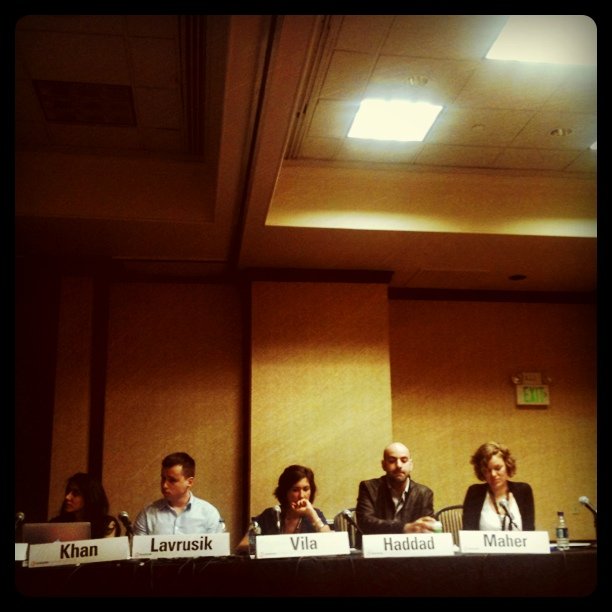Lessons Learned from the Arab Spring - SXSWi

I love SXSW, but hadn't planned to attend this year - work had been busy, and I couldn't quite find the angle of interest... and then Tunisia and Egypt had their revolutions.
Suddenly, the event was chock-full with panels, conversations, and lectures on the role of technology and social media, and the implications of the revolutions on the future of the Middle East - and as someone following the region and events with great interest, I found myself on a last-minute plane to Austin to speak on a panel, "Lessons Learned from the Arab Spring Revolutions". It was a dizzying few days, but here they are: highlights from my #arabspring panel and the week:
- Azmat Khan, a journalist at Frontline PBS and associate producer of the documentary "Revolution in Cairo" told stories that were new to many in the room, including one about the mashup of high tech and street tactics. Activists - including the Muslim Brotherhood and football (soccer) clubs - had infiltrators in pro-Mubarak forces and would communicate news of impending attacks on Tahrir via mobiles. Activists inside Tahrir would consult printouts of Google Maps and use microphones to conduct dynamic crowd control, directing reinforcements and resources as necessary.
- Susannah Vila, Director of Content and Outreach at Movements.org, raised the point that sometimes private platforms aren't the safest place for activists - a point she's made often in the past. This theme later got a testy revisiting at a panel on privacy and social media, where the digital luminaries Jillian York, Danny O'Brien, and Rebecca Mackinnon sat with Ebele Okobi-Harris, director of Business & Human Rights at Yahoo!, and discussed Flickr's recent takedown of images posted by activist and journalist Hossam Hamalawy from the Egyptian State Security archives. When asked by the audience about the key takeaways, my response was succinct: HTTPS Everywhere, and always.
- Jillian York, a researcher on privacy and censorship with Harvard's Berkman Center, has written critically about Facebook's real name policy, an issue Google has addressed through differentiating anonymity from psuedonimity. However, Habib Haddad, an entrepreneuer focusing on the Middle East, founder of Yamli.com, and co-founder of Alive in Egypt, observed that communicating with people under their real names created interpersonal linkages and trust networks that might not have been possible in an anonymous environment. Many people made the point that the real name policy might serve as an effective deterrent to counter-revolutionary trolls and digital swarms, seen in Egypt, Bahrain, and elsewhere in the region.
- Habib also talked about the importance of emotional appeals and personalization in the social media content fueling the Egyptian revolution. He observed that the Facebook page for Khalid Said was set up as a reaction to abuses, but it was the death of the anonymous innocent - and the abstracted projection of identity - and the use of the first person narrative that was most effective in spurring action. He emphasized the personalization of emotional media - images, songs, and video - by activists, a phenomenon I noted might be the first remixed revolution - a la Creative Commons.
- Like the good nerds we are, we also talked about iteration in revolution: the idea that the use of user generated content by broadcast networks evolved the purpose of that content, from witness to narrative; the idea that social media itself passed through distinct phases, from organizer to broadcast mechanism; the observation that broadcast satellite networks provided a platform for iterative evolution of protester demands; and the ability of repressive governments to refine their tools of control through responding to the failings of others.
Other highlights?
- Jen Preston and Brian Stelter of the NY Times leading the #socialfuel conversation to a full house as a continuation and expansion of the discussion of our panel - addressing the role of the press, risk to journalists and sources, and the creeping spectre of bias.
- Clay Shirky, taking on the question of why we think social media is revolutionary, pointing out that models don't hold - "China is not the Middle East".
- Ayah Bdeir and Jon Phillips, talking about hacking hardware, and how the builder movement creates tangible subversion of the status quo.
- Brisket, bloodys, and banter with some of smartest minds in online activism (don't worry, what happens in Austin stays in Austin).
And I won't lie: getting featured in Frog Design's DesignMind blog as an appendix to Clay Shirky wasn't too shabby either. Here's another great blog wrap-up "SXSW Arab Spring Panels Put Final Nail in Twitter Revolution Coffin", by my co-panelist Susannah Vila. Some other neat blog coverage here and here.
*(SXSW Interactive, for those who are unfamiliar, is part of the SXSW festival, held every March in Austin, Texas. Interactive draws roughly 15,000 technology folks, while sister festivals Music and Film have their respective 13,000 and 10,000 enthusiasts. SXSW is short for 'South by Southwest', most commonly referred to as 'South-by'.)
